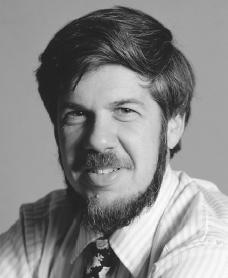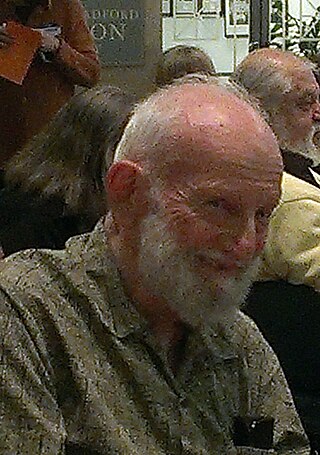
Edward Osborne Wilson was an American biologist, naturalist, ecologist, and entomologist known for developing the field of sociobiology.

Stephen Jay Gould was an American paleontologist, evolutionary biologist, and historian of science. He was one of the most influential and widely read authors of popular science of his generation. Gould spent most of his career teaching at Harvard University and working at the American Museum of Natural History in New York. In 1996, Gould was hired as the Vincent Astor Visiting Research Professor of Biology at New York University, after which he divided his time teaching between there and Harvard.
Sociobiology is a field of biology that aims to explain social behavior in terms of evolution. It draws from disciplines including psychology, ethology, anthropology, evolution, zoology, archaeology, and population genetics. Within the study of human societies, sociobiology is closely allied to evolutionary anthropology, human behavioral ecology, evolutionary psychology, and sociology.
Biological determinism, also known as genetic determinism, is the belief that human behaviour is directly controlled by an individual's genes or some component of their physiology, generally at the expense of the role of the environment, whether in embryonic development or in learning. Genetic reductionism is a similar concept, but it is distinct from genetic determinism in that the former refers to the level of understanding, while the latter refers to the supposed causal role of genes. Biological determinism has been associated with movements in science and society including eugenics, scientific racism, and the debates around the heritability of IQ, the basis of sexual orientation, and evolutionary foundations of cooperation in sociobiology.
Irven DeVore was an anthropologist and evolutionary biologist, and Curator of Primatology at Harvard University's Peabody Museum of Archaeology and Ethnology. He headed Harvard's Department of Anthropology from 1987 to 1992. He taught generations of students at Harvard both at the undergraduate and graduate levels. He mentored many young scientists who went on to prominence in anthropology and behavioral biology, including Richard Lee, Robert Trivers, Sarah Hrdy, Peter Ellison, Barbara Smuts, Henry Harpending, Marjorie Shostak, Robert Bailey, Leda Cosmides, John Tooby, Richard Wrangham and Terrence Deacon.

Richard Charles Lewontin was an American evolutionary biologist, mathematician, geneticist, and social commentator. A leader in developing the mathematical basis of population genetics and evolutionary theory, he applied techniques from molecular biology, such as gel electrophoresis, to questions of genetic variation and evolution.
Steven Peter Russell Rose is an English neuroscientist, author, and social commentator. He is an emeritus professor of biology and neurobiology at the Open University and Gresham College, London.

Sociobiology: The New Synthesis is a book by the biologist E. O. Wilson. It helped start the sociobiology debate, one of the great scientific controversies in biology of the 20th century and part of the wider debate about evolutionary psychology and the modern synthesis of evolutionary biology. Wilson popularized the term "sociobiology" as an attempt to explain the evolutionary mechanics behind social behaviour such as altruism, aggression, and the nurturing of the young. It formed a position within the long-running nature versus nurture debate. The fundamental principle guiding sociobiology is that an organism's evolutionary success is measured by the extent to which its genes are represented in the next generation.

Not in Our Genes: Biology, Ideology and Human Nature is a 1984 book by the evolutionary geneticist Richard Lewontin, the neurobiologist Steven Rose, and the psychologist Leon Kamin, in which the authors criticize sociobiology and genetic determinism and advocate a socialist society. Its themes include the relationship between biology and society, the nature versus nurture debate, and the intersection of science and ideology.

David Sloan Wilson is an American evolutionary biologist and a Distinguished Professor Emeritus of Biological Sciences and Anthropology at Binghamton University. He is a son of author Sloan Wilson, a co-founder of the Evolution Institute, and a co-founder of the spinoff nonprofit Prosocial World. He has studied social evolution in Binghamton.

Richard Levins was a Marxist biologist, a population geneticist, biomathematician, mathematical ecologist, and philosopher of science who researched diversity in human populations. Until his death, Levins was a university professor at the Harvard T.H. Chan School of Public Health and a long-time political activist. He was best known for his work on evolution and complexity in changing environments and on metapopulations.
Science for the People (SftP) is an organization that emerged from the antiwar culture of the United States in the late 1960s. Since 2014 it has experienced a revival focusing primarily on the dual nature of science. The organization advocates for a scientific establishment that is not isolated from society, rather one that uses scientific discoveries to advocate for and advance social justice and critically approach science as a social endeavor.
Charles J. Lumsden is a Canadian biologist in the Department of Medicine and Institute of Medical Science, University of Toronto. He has been an early proponent of sociobiology, looking to our genetic nature to supplement culture in describing what makes us human. He wrote two influential books in collaboration with Edward O. Wilson Genes, Mind and Culture: The Coevolutionary Process. and Promethean Fire: Reflections on the Origin of Mind. Part of his interests lies in the mathematical and philosophical bases of physical theory in biology, and the origins of creativity. He has also co-edited biology textbooks, notably Physical Theory in Biology: Foundations and Explorations 1997.

On Human Nature is a book by the biologist E. O. Wilson, in which the author attempts to explain human nature and society through sociobiology. Wilson argues that evolution has left its traces on characteristics such as generosity, self-sacrifice, worship and the use of sex for pleasure, and proposes a sociobiological explanation of homosexuality.

Carola Blitzman Eisenberg was an Argentine-American psychiatrist who became the first woman to hold the position of Dean of Students at the Massachusetts Institute of Technology. From 1978 to 1990, she was the dean of student affairs at Harvard Medical School (HMS). She was a long-time lecturer in the Department of Global Health and Social Medicine at HMS. She was also both a founding member of Physicians for Human Rights and an honorary psychiatrist with the Massachusetts General Hospital in Boston. After retiring, she was involved in human rights work through Physicians for Human Rights, the Institute for Healthcare Improvement, and elsewhere. She turned 100 in September 2017 and died in Lincoln, Massachusetts, in March 2021 at the age of 103.
John A. Dupré is a British philosopher of science. He is the director of Egenis, the Centre for the Study of Life Sciences, and professor of philosophy at the University of Exeter. Dupré's chief work area lies in philosophy of biology, philosophy of the social sciences, and general philosophy of science. Dupré, together with Nancy Cartwright, Ian Hacking, Patrick Suppes and Peter Galison, are often grouped together as the "Stanford School" of philosophy of science. In 2023, he was elected to the American Philosophical Society.
The International Committee Against Racism was the "mass organization" of the Progressive Labor Party in the United States. It was founded in 1973 once it had become clear that the Worker Student Alliance section of the Students for a Democratic Society could not sustain itself and that a new group with a more long-term vision not focused on students was going to be needed. Anti-racism was chosen as the focus for that new group.
Christopher T. Walsh was a Hamilton Kuhn professor of biological chemistry and pharmacology at Harvard Medical School. His research focused on enzymes and enzyme inhibition, and most recently focused on the problem of antibiotic resistance. He was elected to the National Academy of Sciences in 1989.
This outline is provided as an overview of, and topical guide to Harvard University:

The Evolution of Human Sexuality is a 1979 book about human sexuality by the anthropologist Donald Symons, in which the author discusses topics such as human sexual anatomy, ovulation, orgasm, homosexuality, sexual promiscuity, and rape, attempting to show how evolutionary concepts can be applied to humans. Symons argues that the female orgasm is not an adaptive trait and that women have the capacity for it only because orgasm is adaptive for men, and that differences between the sexual behavior of male and female homosexuals help to show underlying differences between male and female sexuality. In his view, homosexual men tend to be sexually promiscuous because of the tendency of men in general to desire sex with a large number of partners, a tendency that in heterosexual men is usually restrained by women's typical lack of interest in promiscuous sex. Symons also argues that rape can be explained in evolutionary terms and feminist claims that it is not sexually motivated are incorrect.









